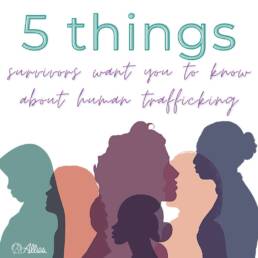Five Things Survivors Want You to Know About Human Trafficking
January is Human Trafficking Awareness Month, and this year we asked a few of the young survivors we work with what they wanted YOU to know about human trafficking. We will be unpacking each of these 5 areas right here on our blog, and over on our social media channels and podcast throughout the month. We encourage you to tune in, follow along, and share what you are learning!
Here’s what these wonderful young ladies wanted you to know:
- It can happen to anyone.
- “I’ve met so many people who have been through similar things to me and we both would have never thought.”
- “If you don’t think it can happen to you, there is a higher chance of it happening, it could happen to anyone.”
- “It’s so important for one to take necessary steps for themselves to ensure their safety when meeting up with people they’ve never met on the internet. Watch for warning signs.”
- Scripted like conversations
- Seemingly being controlled or abused
- No id or personal belongings
- Drugs
- Seemingly to anxious
- Overly sexual behavior
- It’s often mental chains not physical chains.
- “It’s more mental chains, grooming is a more integral part of it. Blackmailing is a huge part of it.”
- Familial trafficking is often more common than romantic partners.
- “Familial trafficking can be more popular than trafficking from someone you are romantically involved in” –
- Survivor situations aren’t all the same.
- “I refused to claim the title “survivor” or would avoid saying I was sex trafficked because I didn’t relate to what I thought sex trafficking was. My situation was familial so it felt like that’s just what life was supposed to be like, there weren’t any ties to or friends to lose, my trafficker was my mother and I could never imagine life without her.” –
- Getting help can feel selfish.
- “The consequences of me telling all felt like my fault, I went into the system, my little brother who had nothing to do with the situation went into the system.”


